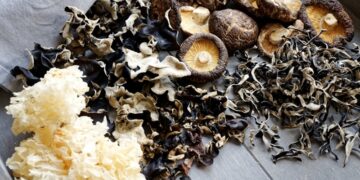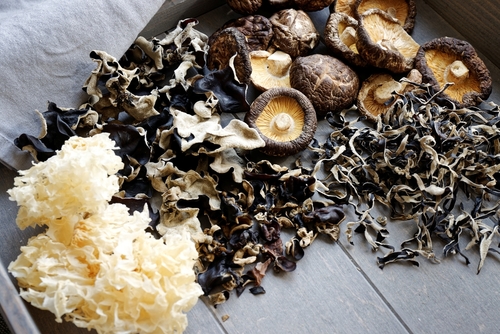There was a time when my body felt like it was constantly in defense mode—tense, tired, foggy, and always on edge. I wasn’t getting sick per se, but I wasn’t well either. My mind was sluggish, my sleep was shallow, and every little thing felt like too much.
I didn’t need another stimulant or supplement promising instant focus or energy. I needed something deeper—something that would help regulate my body, not push it harder. That’s when I started working with medicinal mushrooms.
At first, I was skeptical. Mushrooms as medicine felt more like folklore than science. But the more I explored, the more I realized these fungi weren’t just trendy—they were time-tested, deeply researched, and genuinely transformational when used with intention.
A Legacy Rooted in Tradition
Medicinal mushrooms have been part of traditional healing systems for thousands of years. In Traditional Chinese Medicine, mushrooms like reishi were used to “calm the spirit” and strengthen the body’s vital life force. In Siberian and Indigenous cultures, chaga was brewed to survive long winters. Buddhist monks consumed lion’s mane to support focus during meditation.
Today, we have the language of beta-glucans, polysaccharides, and neurotrophic factors to explain what ancient cultures already knew. These fungi offer more than nutrition—they modulate, protect, and restore.
Reishi: The Nervous System Whisperer
Reishi (Ganoderma lucidum) is the mushroom I turn to when my body needs rest—but my mind won’t cooperate. Often called the “Mushroom of Immortality,” it’s been revered for its calming, immune-supportive properties for centuries.
It contains triterpenes and beta-glucans—compounds that help regulate the immune response, reduce inflammation, and calm the stress response. But what makes reishi unique is its adaptogenic quality. It helps bring the body back to balance, whether you’re overstimulated or depleted.
When taken regularly, reishi helps quiet mental chatter, support deeper sleep, and bring a grounded quality to daily life. It doesn’t knock you out. It just helps your body remember how to settle.
Lion’s Mane: Fuel for the Brain
Lion’s mane (Hericium erinaceus) looks like a snow-drenched waterfall—and its impact on the mind is just as striking. Traditionally used in East Asia for brain and nerve support, lion’s mane has gained modern attention for its potential to support memory, cognition, and nerve regeneration.
It contains two unique compounds—hericenones and erinacines—that stimulate the production of Nerve Growth Factor (NGF), a protein critical for the growth and maintenance of neurons. That means real support for mental clarity, focus, and long-term brain health.
It’s not a quick-fix nootropic. But taken consistently, lion’s mane brings a subtle sharpening effect. Thoughts connect more easily. The fog lifts. Creativity flows. It’s the kind of support that feels like coming home to your mind.
Other Fungi with Functional Power
Cordyceps
Best known for increasing stamina and cellular energy, cordyceps support ATP production and oxygen efficiency. Traditionally used in Tibetan medicine, they’re now embraced by athletes and those recovering from fatigue or burnout.
Chaga
This birch-dwelling mushroom is a powerhouse of antioxidants, particularly melanin and superoxide dismutase. Chaga helps fight oxidative stress, supports the immune system, and promotes glowing skin from within.
Turkey Tail
Recognizable by its multicolored, fan-like appearance, turkey tail is rich in polysaccharopeptides (PSK and PSP), which help modulate immune function and nourish the gut microbiome. It’s one of the most researched mushrooms in integrative medicine.
Incorporating Medicinal Mushrooms Daily
Medicinal mushrooms are most effective when taken consistently and in forms that preserve their bioactive compounds. Here’s how to bring them into your routine:
-
Dual-extracted powders: These preserve both water-soluble (beta-glucans) and alcohol-soluble (triterpenes) compounds. Add to teas, lattes, or broths.
-
Capsules or tinctures: Ideal for convenience. Look for organic, fruiting-body extracts (not just mycelium on grain).
-
Tea infusions: Especially for chaga or reishi slices—simmered for hours for a deeply grounding brew.
A few favorites:
-
Reishi hot cacao in the evening to support restful sleep.
-
Lion’s mane in a matcha latte to start a focused workday.
-
Cordyceps powder in a pre-workout smoothie.
-
Chaga simmered in water with cinnamon, ginger, and a splash of lemon.
These aren’t just ingredients—they’re daily allies.
What to Look for When Buying
-
Fruiting body vs. mycelium: Prioritize fruiting body extracts for higher concentration of active compounds.
-
Dual extraction: Especially important for reishi, chaga, and lion’s mane.
-
Certified organic: Mushrooms absorb everything from their environment—clean growing conditions matter.
-
Third-party tested: For heavy metals, mold, and microbial contaminants.
Choose brands that are transparent about sourcing and extraction—and avoid fillers, grain-based carriers, or unextracted powders if you want therapeutic benefits.
Final Thoughts
Medicinal mushrooms aren’t a quick fix. They don’t offer fireworks or instant gratification. What they offer is depth—true nervous system nourishment, immune intelligence, and cognitive support that builds over time.
They’re slow medicine. Steady medicine. The kind that helps your body find its natural rhythm again.
If you’re looking to support your focus, rebuild your immune system, or create a greater sense of grounded energy—start with mushrooms. One teaspoon. One capsule. One calming cup at a time.



























